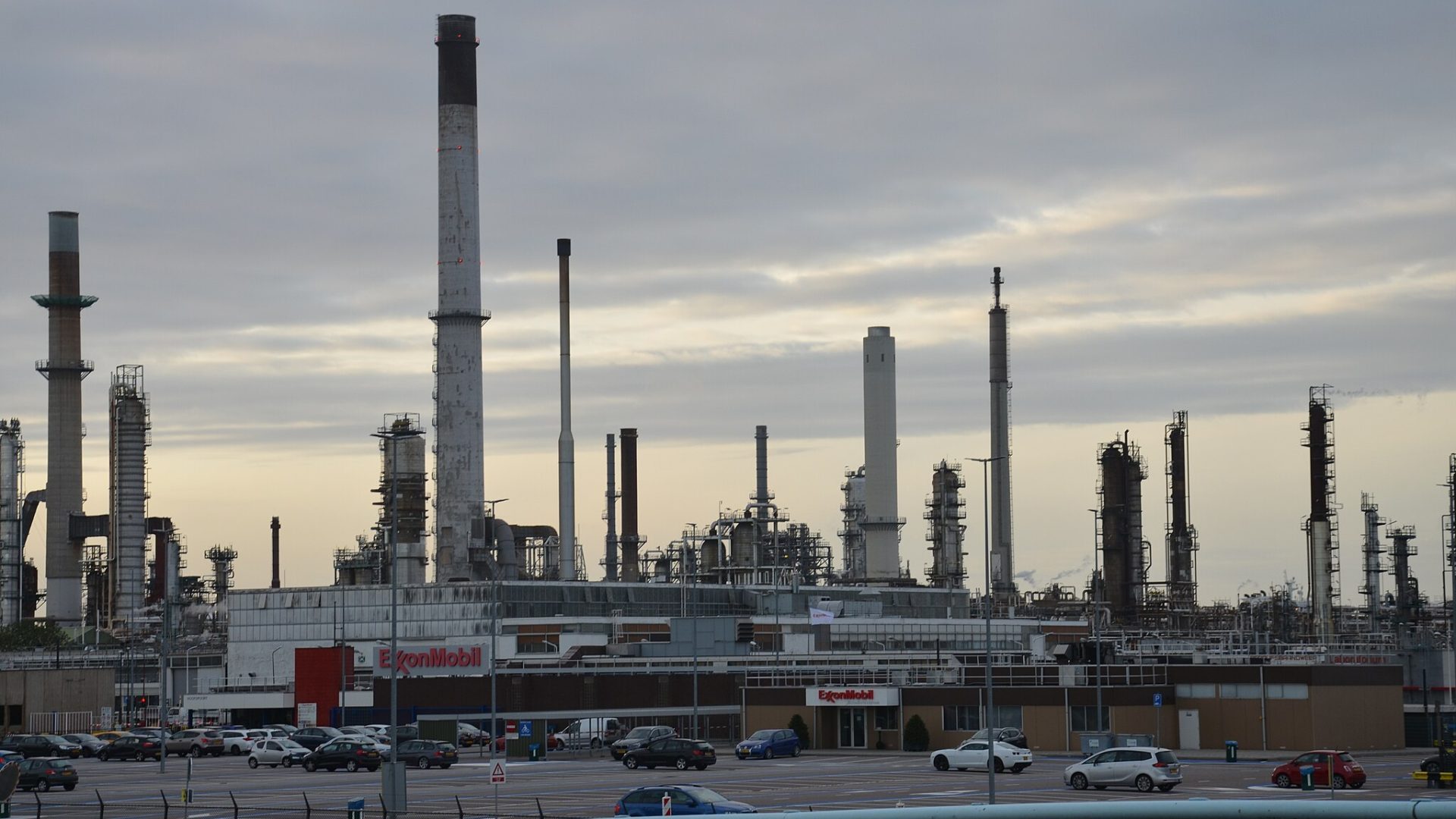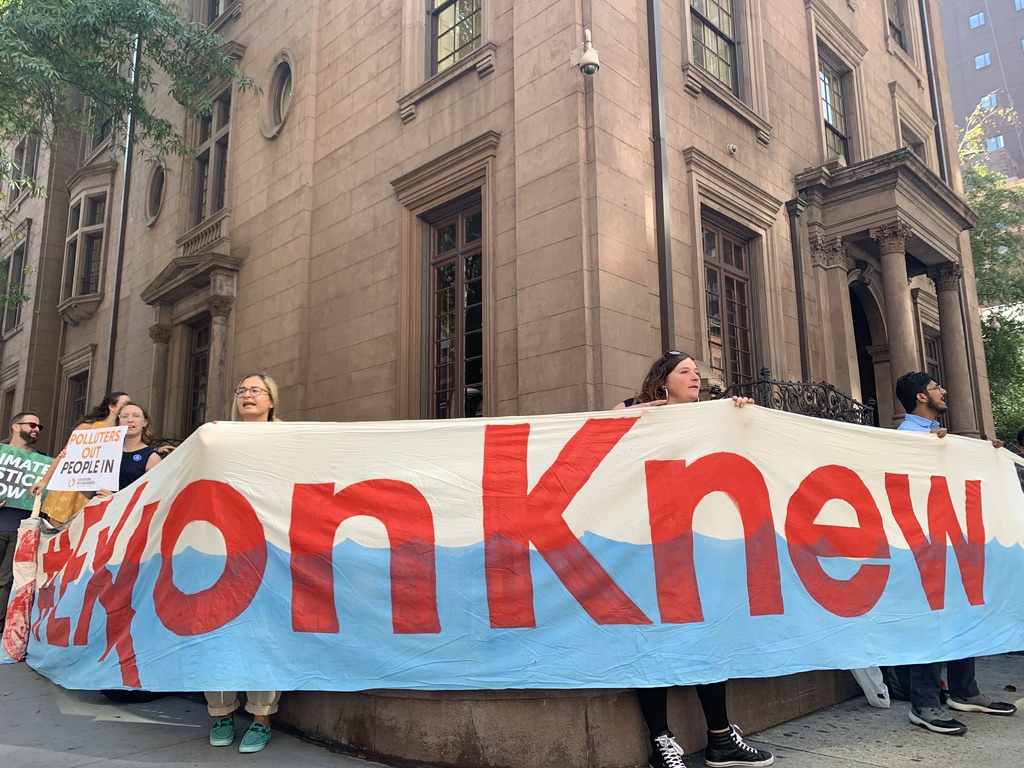
ExxonMobil
Our analysis reveals how ExxonMobil’s climate plans fail to align with international commitments to phase out fossil fuels and to limit global temperature rise to 1.5ºC.
How does ExxonMobil stack up?
Table Key
- Grossly insufficient
- Insufficient
- Partially aligned
- Close to aligned
- Fully aligned
Ambition: Drilling for More Oil and Gas
ExxonMobil does not have a date set to stop exploration, stop approving new extraction projects, or end oil and gas production. ExxonMobil has not set a rapidly declining fossil fuel production target, and therefore its plans are dangerously out of step with climate goals.
ExxonMobil plans to continue increasing its oil and gas production this decade. The company expects to increase production by 12 percent from 2023 to 2027 (from 3.7 to around 4.2 million barrels per day) – but this could be even greater. ExxonMobil predicted in 2023 that its merger with U.S. fracking company Pioneer Natural Resources could enable its production to grow to over 5 million barrels per day by 2027.
It’s unthinkable to approve any new fossil fuel development when the majority of oil, gas, and coal in existing fields and mines must stay underground to keep warming to globally agreed limits.
Historical Responsibility
-
2 nd
ExxonMobil's Rank
ExxonMobil’s Rank for most cumulative climate pollution in history among ALL investor-owned companies.
Source: Carbon Majors
-
55.1 billion
Tonnes of CO2e Pollution
linked to ExxonMobil’s fossil fuel production since the 1880s.
Source: Carbon Majors
-
$ 1.2 trillion
Amount Exxon Would Owe
If the company were held partially accountable for the climate loss and damages caused by its pollution since 1985 alone.
Source: Climate Analytics
ExxonMobil CEO, Darren Woods“The industry has to continue to invest, and we saw in 2018, particularly with a lot of the climate emphasis, people were pulling back on that, we leaned in.”
Integrity: Failing Climate Targets
Do ExxonMobil’s actions add up to a credible pathway to 1.5°C?
ExxonMobil has not set any target to reduce its total emissions.
Under ExxonMobil’s existing plans, the company’s climate pollution could continue increasing indefinitely. ExxonMobil’s emissions reduction pledge is a smokescreen – it covers only a small fraction of the company’s total emissions, ignoring pollution caused when the oil and gas ExxonMobil produces and sells is burned.
To meet its climate targets, ExxonMobil plans to rely heavily on the ‘net’ in ‘net zero’ – investing in carbon capture and carbon offsets, which may prolong the life of fossil fuels, have a long track record of failure, and perpetuate injustice. Instead, oil and gas companies should take responsibility for reducing their oil and gas extraction and sales as rapidly as possible.
Meanwhile, there is evidence that ExxonMobil is lobbying against climate action, greenwashing, and otherwise maneuvering to undermine the energy transition.
At a glance
-
$ 36 billion
In Fossil-Fueled Profits
The profits ExxonMobil reaped in 2023, largely from producing and/or selling fossil fuels.
Source: Reuters
-
21
Industry associations lobbying against climate action
ExxonMobil is a member of 21 industry associations that are “Misaligned” on climate policy as of May 2024.
Source: Influence Map
People-Centered Transitions: Inadequately Preparing
While many companies have co-opted the language of ‘just transition’ from labor and climate justice movements in recent years, ExxonMobil rates “Grossly Insufficient” on its real-world just transition plans and on upholding human rights.
Independent analysis confirms that ExxonMobil does not have adequate policies to support and fund just transitions for workers and communities or to uphold human rights and Indigenous Peoples’ rights.
Though ExxonMobil published a human rights statement in January 2024, it makes no mention of Indigenous Peoples’ right to Free, Prior, and Informed Consent. The company also faces ongoing allegations of significant human rights violations.

Rovuma LNG in Mozambique
Communities in the region of Cabo Delgado in Northern Mozambique have been fighting against a “gas rush,” where trillions of cubic feet of gas were discovered in 2006. The Stop Mozambique Gas campaign is the latest effort to push back against land grabs and destructive impacts to local ecology across Mozambique.
Support the campaign to stop ExxonMobil and its partners in Mozambique!
The Say No to Gas! in Mozambique campaign aims to bring an end to the gas industry in Mozambique, focusing on the region of Cabo Delgado in northern Mozambique. Can you support their call?

